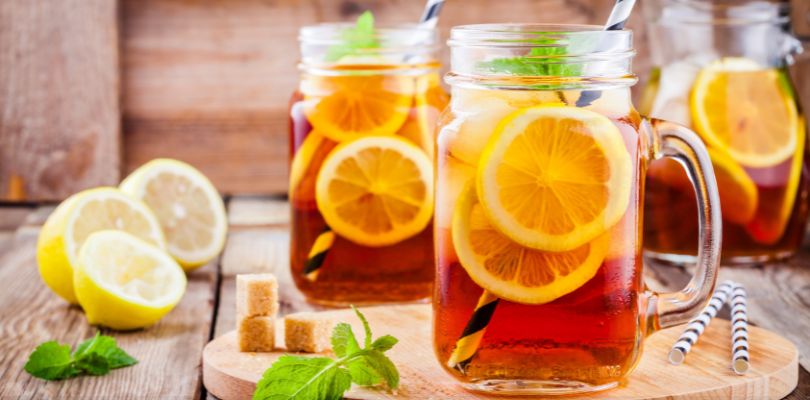Cut These Drinks From Your Diet
Maintaining a balanced, healthy lifestyle is important when battling a brain tumor. Treatment options like Ojemda, a targeted therapy that helps reduce the size of brain tumors, can help alongside altering your diet. Always speak with your doctor about the best treatment plan for your needs. Now, let's look at drinks to avoid with brain tumors.
1. Artificially Flavored Sports Drinks
Many people turn to sports drinks for hydration and electrolyte replenishment, especially after physical activity. However, these drinks often contain artificial ingredients and sweeteners like aspartame, which may exacerbate symptoms for brain tumor patients. Artificial sweeteners have been linked to neurotoxicity and could potentially increase the risk of seizures in people with brain tumors. Plus, the high levels of sugar in sports drinks can lead to blood sugar spikes, which may contribute to inflammation and slow the body’s ability to heal.
2. Diet Soft Drinks
Diet sodas are often seen as a "healthier" alternative to regular sugary drinks, but this is far from the truth, especially for those battling brain tumors. Similar to sports drinks, many diet soft drinks contain artificial sweeteners like aspartame and saccharin, which can increase neurological stress. These artificial ingredients may worsen symptoms like headaches or even contribute to cognitive impairment. Additionally, the caffeine content in diet soft drinks can lead to dehydration and increased intracranial pressure, exacerbating brain tumor-related symptoms.
This article will some of the best cruise options for adults. Read on to learn about 3 amazing cruises for your next vacation.
3. Energy Drinks
Energy drinks are a popular choice for individuals seeking a quick boost of energy, but their high levels of caffeine and other stimulants make them unsuitable for brain tumor patients. Excessive caffeine can lead to increased anxiety, jitteriness and even seizures in those with pre-existing neurological conditions. Some energy drinks also contain taurine, a stimulant that may negatively affect brain activity, worsening symptoms for those with brain tumors. Additionally, the combination of stimulants, sugar and artificial ingredients can cause rapid blood sugar fluctuations, further aggravating symptoms.
4. Alcoholic Beverages
While alcohol is widely known to affect brain function, its specific dangers for those with brain tumors are often underappreciated. Alcohol consumption can increase inflammation in the brain and reduce cognitive function, both of which are significant concerns for brain tumor patients. Alcohol can also interfere with medications used in brain tumor treatment, reducing their effectiveness and increasing the risk of adverse side effects. Moreover, alcohol can impair the immune system, making it harder for the body to fight off tumor growth.
5. High-Sugar Fruit Juices
Fruit juices, particularly those with added sugars, can be harmful for people with brain tumors due to their high glycemic index. While these juices may seem healthy, the concentrated sugar content can spike blood sugar levels and lead to inflammation, which can aggravate the symptoms of a brain tumor. Additionally, excessive sugar intake has been linked to poor outcomes in cancer patients, as it can promote tumor growth by providing fuel for rapidly dividing cells.
6. Milkshakes and Cream-Based Drinks
Milkshakes and other cream-based beverages, while delicious, are often loaded with sugar, fats and artificial flavors. The high-fat content can increase the risk of inflammation in the body, which is detrimental to brain tumor patients. Additionally, many cream-based drinks contain preservatives and artificial ingredients that can be harmful to overall brain health. It’s best to avoid these calorie-dense beverages and opt for healthier alternatives that provide essential nutrients without the added sugar and fat.
7. Sweetened Iced Tea
Iced tea is often marketed as a healthy drink, but many commercially available versions are loaded with added sugars and artificial sweeteners. As with fruit juices and soft drinks, these high levels of sugar can lead to inflammation and compromise the body's ability to heal. Even unsweetened versions can sometimes contain caffeine, which can increase intracranial pressure and worsen symptoms like headaches or dizziness in brain tumor patients.
Treatment Options for Brain Tumors
Brain tumors require a comprehensive treatment approach that often involves surgery, radiation therapy and chemotherapy. The exact treatment depends on the type, location and size of the tumor. Medications such as Ojemda, a targeted therapy for certain types of brain tumors, can also play a role in treatment.
Ojemda works by targeting specific proteins in cancer cells, reducing tumor growth and minimizing damage to surrounding healthy brain tissue. Compared to traditional chemotherapy, Ojemda has fewer side effects because it focuses primarily on the cancer cells.
Final Notes
For individuals dealing with brain tumors, maintaining a healthy diet and avoiding certain drinks can make a significant difference in managing symptoms and improving overall health. By cutting certain drinks to avoid with brain tumors and consulting healthcare professionals for appropriate treatment options, patients can better manage their condition and improve their quality of life during treatment.







